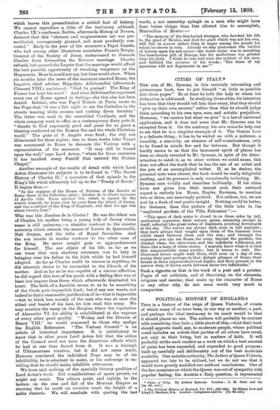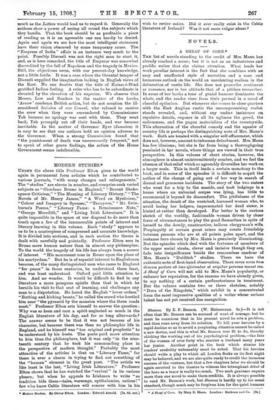POLITICAL HISTORY OF ENGLAND-1' Tins is a history of the
reign of Queen Victoria, of events of which many of us have been, in one way or another, a part, and perhaps the ideal testimony to its merit would be that it should please no one. The authors will probably be content with something that falls a little short of this,—that their book should approve itself, say, to moderate people, whose political creed includes an article that parties of all colour have erred, not only in their living, but in matters of faith. It will probably strike such readers as a work on which a vast amount of pains has been expended, and expended to good purpose; built up carefully and deliberately out of the beat materials available. One notable authority, The Letters of Queen Victoria, appeared too late to be utilised, but we do not see that it would have greatly modified our authors' conclusions. One of the few occasions on which the Queen was out of sympathy with - popular feeling, the Austria a Italy question, is represented
• Cities of Itcay. By Arthur Symons. London : J. IL Dent and Co. 8d. net.] P The PolucaiBristory of England, Vol. XII., 1837-2901. By Sidney Low and Lloyd C. Sanders, BA. London : Longman. and.Co. [7.. a net.]
much as the Letters would lead us to regard it. Generally the authors show a power of seeing all round the subjects which they handle. That the book should be as profitable a piece of reading as it is an agreeable one can hardly be denied. Again and again we see how the most intelligent statesmen have their vision obscured by some temporary cause. The "Empress of India" affair is an instance very much to the point. Possibly Disraeli was not the right man to start it, and, as is here remarked, the title of Emperor was somewhat discredited by the fall of Napoleon and the tragedy in Mexico. Still, the objections seem, with our present-day knowledge. not a little futile. It was a case where the Oriental temper of Disraeli supplied the imagination lacking in English views of the East. No one doubts that the title of Kaisar-i-Hind gratified Indian feeling. A ruler who has to be subordinate is elevated by the elevation of his superior. We observe that Messrs. Low and Sanders in the matter of the lorcha 'Arrow' condemn British action, but do not mention the ill- considered decision of our Consul, who refused to receive the crew when they were surrendered by Commissioner Yeh because no apology was sent with them. They went back, Yeh promptly cut off their heads, and war became inevitable. In the matter of Governor Eyre (Jamaica) it is easy to see that our authors hold an opinion adverse to the Governor. When a strong Commission found that "the punishment of death was unnecessarily frequent," not to speak of other grave findings, the action of the Home Government seems indefensible.





































 Previous page
Previous page